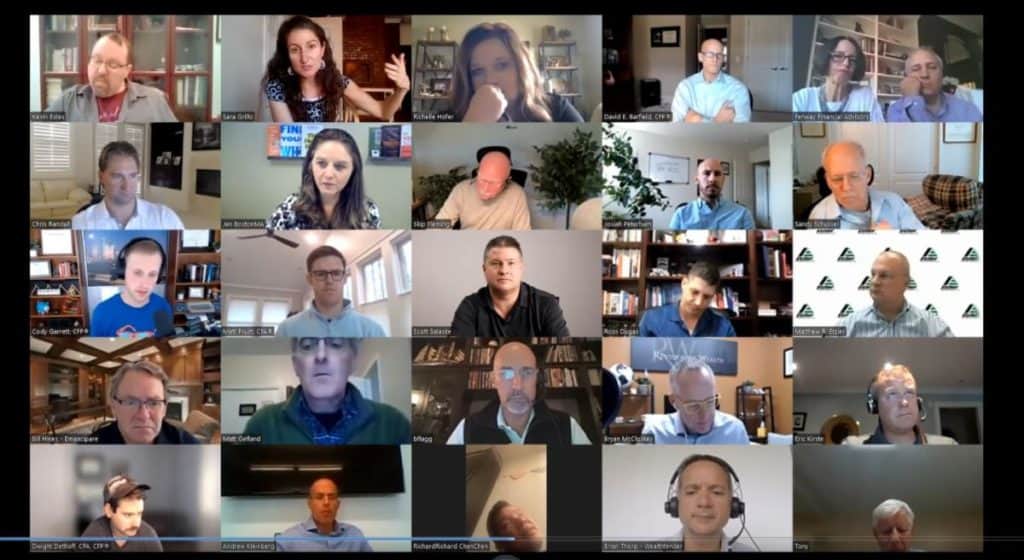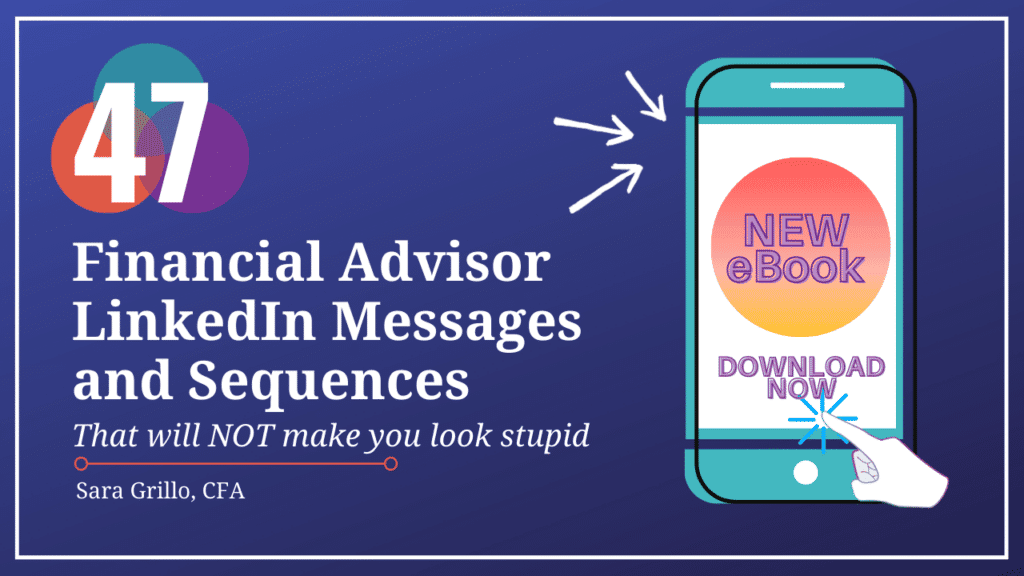Podcast: Play in new window | Download
Given the sorry state of America’s finances, how are average households going to address income “sustainability” over 3+ decades? Is selling annuities to them the answer?
Let’s talk about it. In today’s show we’re going to be debating a variety of topics related to the retirement crisis in America, the role that financial advisors and insurance agents play, and how to harmonize the two together (if even possible, lol).
The contenders are:
David Macchia is the founder and CEO of Wealth2k and a defender of annuities.
Gary Mettler is the “Annuity Maestro” and author of “Always Keep Your Hands Up” – The Immediate Annuity Story.
Scott Salaske, CEO of Firstmetric. He is a flat fee advisor; not a licensed insurance agent.
And me! For those of you who are new to my blog, my name is Sara. I am a CFA® charterholder and financial advisor marketing consultant. I have a newsletter in which I talk about financial advisor lead generation topics which is best described as “fun and irreverent.” So please subscribe!

Harmonizing the two sides to solve the American retirement crisis
The retirement crisis in America is real. Financial advisors have many options at their hands to solve it, from financial planning and investment management services to fixed products such as annuities. Yet the investment and insurance communities seem to be on two different sides of the fence when it comes to a solution.
With annuities now being able to be offered in 401k plans, the playing field has changed. Fee only advisors can now purchase annuities for their clients without having to be licensed agents. It seems the two sides are moving closer together – but what is the best way to harmonize?
We had a great time discussing that in our debate. Should advisors go to hell before selling an annuity? Are annuities the solution to the retirement crisis, or are there other options?
Have a listen and see what you think!
Questions we’ll debate:
- Ken Fisher said, “I would die and go to hell before I would sell an annuity.” Are statements like these a crime against annuities?
- Do advisors breach fiduciary duty when they fail to recommend annuities?
- Should those with only insurance licenses that allow them to sell annuities and/or life insurance be held to the same “fiduciary standard” as Registered Investment Advisers (RIAs) with the SEC or state regulators?
- Are commissions bad?
- Should the insurance companies themselves and/or others who provide marketing services and who assist advisors in marketing/selling annuities or insurance products also be held to the fiduciary standard?
#1 Should you go to hell before you sell an annuity?
According to Macchia, that Ken Fisher’s statement is an indictment against constrained investors who need protection for their longevity, and an “affront against decency.” No retiree stops needing income. There are a great percentage of people who are naked in terms of their longevity. There are people whose standard of living in retirement is being destroyed by having them take current income out of equity based investments. To protect them, you have to make sure that in the first critical 10 years of retirement that they are not taking their income from an equity.
Mettler is a fan of annuities, but not all annuities. He thinks the industry has been weighted towards investment savings type products. To be retired for 30 years is a long time. Investments savings account type annuities are not designed to withstand the stresses of life that households go through. The insurance policies will lapse. He thinks that some annuities for investment savings accumulation are okay, but many people will not be able to keep their contracts to sustain the withdrawals they didn’t anticipate making as life happens.
Single premium income annuities (SPIAs) haven’t gotten much attention but Gary thinks these are the type of annuity that is better suited to meeting people’s needs.
Salaske agrees with Macchia that there is a certain class of person who might benefit from an annuity, and in that situation a SPIA would be a possible solution. The issue Salaske has is that a lot of people don’t understand the mechanics of how an annuity works. They eventually realize it wasn’t structured properly to provide income to their spouse after they are gone, or they didn’t understand the difference between the policy’s beneficiary, annuitant, and owner.
In Salaske’s view, education is the issue because annuities are sold products. He is not a fan of the “annuities across the board” approach and believes they are only suitable for a very small percentage of the overall population.
Macchia comments that Salaske isn’t indicting annuities as much as incompetent annuity agents. In Macchia’s opinion, an annuity is insurance, not an investment and shouldn’t be compared as such. He agrees with Mettler that SPIAs, which are pure insurance for income, should be a sought after consumer vehicle. But they have been muddled up by bad press and competing monetary models that the narrative gets twisted.
Mettler agrees the industry has become muddled. Having been an agent since 1983, Mettler has seen the insurance industry evolve into wanting to be in the investment advisory business; they want their agents to sell annuities with an investment savings component (variable annuities, indexed annuities). Once the insurance industry did that, the investment industry said, “Well if you want to do that, you have to compete with us.”
These are savings devices with nuanced savings results that you may or may not get. Some are market-based, the level of interest credited to the account can vary. There are a range of risk layoffs that the industry exchanges to the consumer for a fee.
Mettler says that nobody wants to be in the fixed guarantee business anymore. Market-based annuities transfer more of the risk to the consumer and in his view society can not withstand such a pressure.
Macchia agrees with Mettler that the investment industry stole the conversation away from the insurance industry. When he came into the business, the insurance industry ran the pensions of the United States. Then we had ERISA, the Employee Retirement Income Security Act, which Macchia calls “ERA” because there’s so security or income.
Salaske says that Metter and Macchia make some good points, but that in the 20 years he’s been in the business he has only run into annuities that are not true insurance-based contracts, such as SPIAs. If you go to a broker-dealer or a large RIA firm, selling annuities is on the agenda and often it has more to do with the product’s profitability to the firm rather than the consumer’s needs.
Grillo jumps in, hypothesizing that there is not enough of a match between the skills required to sell an annuity and what it takes in reality in terms of understanding if the product truly matches up with what the client needs. Grillo believes annuities are oversold. She then asks Salaske how he manages retirement for a constrained investor without using annuities.
Salaske says it starts with a question of risk – how much risk do you want to guarantee, and if there are no annuities, the next level of risk (with no guarantees) would get you back to fixed income, dividends, and other cash flow producing instruments. If you didn’t want equity risk tied to your income, you would structure the portfolio for cash flow using fixed income, which has interest rate risk. As the bonds mature, you would replenish that with equities over long periods.
Macchia says this is ignoring longevity risk. Salaske agrees that many advisors don’t do a great job. They structure the portfolio to provide current income and draw down 4% from the portfolio’s dividends and interest while keeping the portfolio intact. Salaske says this isn’t right from a longevity standpoint and that is should instead be managed on a total return basis. Salaske said there is a lot of deficiencies in getting to know the client and understand their needs, both on the part of advisors and also insurance professionals.
Macchia mentions that there are firms that have sprung up offering no load products, products that report into your portfolio management system, wrap-able products, etc.
Salaske says he has a big problem with insurance and annuity sales when large RIA firms will claim not to sell insurance or sell annuities, and then in their 50 page ADV you see that their independent representatives will sell insurance in their individual capacities (whatever that means!). They’re out there marketing as fiduciaries, saying they’re better for having nothing to do with insurance, yet you can have people directly employed, either as employees, partners, or shareholders in the firm, acting in their individual capacities selling annuities or insurance.
Machia says this is crazy. He looked at 40 RIA firm websites of all sizes. In not one instance did he find the words “retirement income.” He contends that the RIA community does not even begin to understand what retirement income is about. Macchia says this will cost them when we have the next market break, because retirement income planning is not the same as financial planning, the RIA community does not get it, and it’s a tragedy.
Mettler says that many don’t know the difference because they came up in the business on the investment side. He does add however that he is critical of those who do understand the difference and choose to ignore it for business purposes.
Metter says that the way this is regulated is not designed for the 21st Century, with the investment side being regulated by the SEC and FINRA, and the insurance side regulated by the 50 states, and there has not been a meeting of the minds. Mettler says he does not have a securities license for this reason.
Mettler is a CFP® certificant and he says that even the CFP Board passed a fiduciary guideline. He can’t get them to give him a straight answer about how that affects a non-securities licensed individual. They told him to read the FAQs (lol)! Macchia chimes in, saying he finds it ironic that the first module in the CFP program is risk management, which he interprets to be about insurance.
Plus, Mettler continues, nobody ever knows who gets paid what in the insurance business. He says that needs to come forward. He does not think it will be in his lifetime.
#2 Should those with only insurance licenses that allow them to sell annuities and/or life insurance be held to the same fiduciary standard as registered investment advisors?
Mettler says that at the end of the day he does think there needs to be a higher standard for insurance-licensed people but does not know what that would mean. He thinks it is probably needing to be higher than the “best interest” standard. But the fiduciary standard? He doesn’t know if it is even possible.
Macchia says he would be for a universal fiduciary standard, and he also would be for fiduciaries being fiduciaries. He doesn’t even think an AUM model can be a fiduciary one. It’s not the cheapest for the client.
Mettler says there are other fee models coming into the RIA space but they are still a small percentage at this point. Salaske agrees.
Salaske sees the term “fiduciary” as a watered-down term used for marketing purposes. He said that a prospective client called him today, saying that he hears everyone calling themselves a fiduciary and wanted to know if he was one. The regulators have watered the term down through Regulation Best Interest and it’s very harmful because it makes the people who are not looking out for the end client’s best interest look the same as the ones who truly are.
#3 Should the insurance companies themselves and/or others who provide marketing services and who assist advisors in marketing/selling annuities or insurance products also be held to the fiduciary standard?
Grillo questions, should a junior marketing professional or paraplanner assisting advisors who sell annuities be required to be a fiduciary.
Salaske says that it could be the insurance company itself. Should they be required to make sure their agents are selling annuities properly, to train them properly, or should they sit back and have no responsibility for this?
Mettler says that typically in insurance, the company doesn’t exert control over their agents. He doesn’t feel carriers should have to be fiduciaries because they are just putting the product out there. In his view, the distributor should be the one to have to rise to fiduciary level. He muses that perhaps the distributor should be subsidized to make sure the agents are proceeding as fiduciaries, and this would likely be a shakeup.
Macchia argues that mutual funds and REITs are not fiduciaries; product manufacturers are typically not.
Are commissions bad?
Macchia says they are not bad, they’re just a different way to get paid.
Salaske asserts that it is a question of if it’s disclosed properly. Advisors have their own indiscretions in that regard, with ADVs being very murky about actual fees charged. He says there could be more standard ways of disclosing hard dollar compensation and what services exactly you are getting for that, regardless of fee model.
Mettler says that agents should disclose what they are paid when they sell an annuity, and they should also disclose what the upline (master distributor) compensation is. He says that he sometimes doesn’t know what the upline is although he is very diligent about disclosing what he is paid.
Salaske said he wonders if the people who really need them are getting sold annuities that don’t produce a huge commission. Macchia says that agents would be happy to take even a small commission. Salaske and Grillo bristled, but did not rebut back.
Sara’s upshot
What did you think of our debate on selling annuities? Do you have a burning opinion you’d like to share? If so, please holler at me on LinkedIn and let’s hash it out on there!

And if you want to join the right for higher ethics in financial advice, join the Transparent Advisor Movement.

These meetups are free and the goal is to learn from each other about how to grow and manage a transparent wealth management practice for the benefit of clients.
Even if you can not make the meetup, or even attend in its entirety, please register for the replay and to be notified of the next one. We meet on the second Wednesday of the month at 1 PM ET.
And if you are seeking marketing advice…
Learn what to say to prospects on social media messenger apps without sounding like a washing machine salesperson. This e-book contains 47 financial advisor LinkedIn messages, sequences, and scripts, and they are all two sentences or less.

You could also consider my financial advisor social media membership which teaches financial advisors how to get new clients and leads from LinkedIn.

Thanks for reading. I hope you’ll at least join my newsletter about financial advisor lead generation.
See you in the next one!
-Sara G
About Scott Salaske
Scott Salaske is the founder and CEO of Firstmetric, a flat fee financial advisor firm in Troy, Michigan. Ever since the beginning of his 20+ year long career, Scott has pursued his mission of delivering high quality financial advice in a low cost and unbiased way.
Early on in his entrepreneurial journey, Scott saw firsthand the inherent flaws and conflicts of interest in the traditional sales and product driven approach, as several family members had lost a significant portion of their hard-earned life savings to high-cost, commission-based investment products and inappropriate advice.
It was at that point Scott thought there had to be a better way for investors to obtain unbiased advice and low-cost access to the financial markets. That lead him to start Quest Asset Management, with the novel idea of putting investor interests first as a fiduciary, which was practically unheard of at the time. The idea centered on the concepts of simplicity, keeping total investment costs and taxes extremely low and developing a custom investment plan for each client using low-cost asset class and index funds.
A few years later Scott merged Quest with another local investment advisory firm, Portfolio Solutions, that shared the same investment principles at that time. Several years after the combined merger, Scott went on to grow the combined firm from advising approximately $60 million in client investment assets under management to more than $1.4 billion. In early 2015, Scott sold his ownership interest in the firm. He started Firstmetric a few years later.
At Firstmetric, Scott continues his mission of delivering low cost, unbiased advice to clients. Along his journey he has been quoted in the following publications: The Wall Street Journal, Investor’s Business Daily, Kiplinger’s Retirement Report, TheStreet.com, Cheddar.TV, Crain’s Detroit Business and MarketWatch.com; among others.
About David Macchia
David Macchia is retirement income strategist, entrepreneur, public speaker, and author focused on strengthening retirement security. He is Founder & CEO of Wealth2k, Inc., the leading provider of retirement income distribution solutions. David has worked closely with leading banks, insurers, and broker -dealers to develop and implement successful solutions for the retirement income market. His programs have helped financial advisors produce investment and annuity product sales totaling more then $150 billion.
David is the creative force behind several popular retirement income programs including the groundbreaking, The Income for Life Model®. Last year, David introduced Women And Income®, the first retirement income solution developed expressly for “boomer” women.
David writes frequently about retirement income planning. His articles have appeared in numerous industry publications including Advisor Perspectives, InvestmentNews, Financial Advisor Magazine, ThinkAdvisor, Bank Investment Consultant, Wealth Management, Retirement Income Journal, and Investment Advisor. A staunch defender of annuities, earlier this year, David wrote the wildly popular article, The Trial of Ken Fisher for Crimes Against Annuities. He has also authored two retirement income planning books for consumers, Lucky Retiree and Constrained Investor: How to Avoid a Devastated Retirement.
Recently, David introduced a new solution for retirement income planning called Constrained Investor®. This new income planning framework helps financial advisors more effectively address the needs of millions of retirees. These Constrained Investors are best served with an income strategy that promotes consistent investing, while also mitigating risks that threaten the continuation of retirement income.
One of David’s passions is to “give back” in a way that encourages the building of a more equitable society. He is leading Project 6000 Minutes, an effort to deliver free, basic financial education to Black, Hispanic, Latina and other women of color.
David earned an MBA, with Honors, from the Boston University Questrom School of Business. He has also earned the Retirement Management Advisor (RMA®) and CBBF professional designations.
About Gary Mettler
Gary S. Mettler, CFP©, CEBS, has a thirty-year, eclectic annuity career that has earned him the informal but accurate title of “the annuity maestro.” His experiences as an annuity agent included legal and actuarial training, commercial retail contracts, charitable gift contracts, structured settlements, home office annuity product design, and advanced annuity sales. As a litigation economist, he specialized in retirement plan valuation and rendered thousands of opinions regarding defined benefit and defined contribution retirement plans property matters for divorcing couples. He is an experienced trial expert witness.
As a nationally published author, Mettler’s annuity articles have appeared in numerous periodicals including Benefits Quarterly, Senior Market Advisor, LifeHealthPro and Financial Planning. In addition, his white papers on SPIAs and RMDs, DIAs and SPIAs and marital property considerations, and temporary life annuity contracts serve as research references for other industry contributors.
Mettler began his formal education at the United States Military Academy at West Point and completed studying business economics at the University of California at Santa Barbara. After having suffered a total loss of all his possessions following the 1994 Northridge Earthquake in California and working with countless families in his litigation economic practice, he has seen people at their best and at their worst. The death of his spouse several years later, leaving minor children in his care, cemented his commitment to working with individuals and insurance products, such as annuities and life insurance that work to protect individuals and their families.
Sources
Macchia, David.(29 February, 2022). Advisor Perspectives. The Trial of Ken Fisher for Crimes Against Annuities. https://www.advisorperspectives.com/articles/2022/02/09/the-trial-of-ken-fisher-for-crimes-against-annuities
Disclosures
Grillo Investment Management, LLC does not guarantee any specific level of performance, the success of any strategy that Grillo Investment Management, LLC may use, or the success of any program. Nothing in these materials may be construed as an investment, insurance, or financial recommendation.
Grillo Investment Management, LLC will strive to maintain current information however it may become out of date. Grillo Investment Management, LLC is under no obligation to advise users of subsequent changes to statements or information contained herein. This information is general in nature; for specific advice applicable to your current situation please contact a consultant or advisor.





